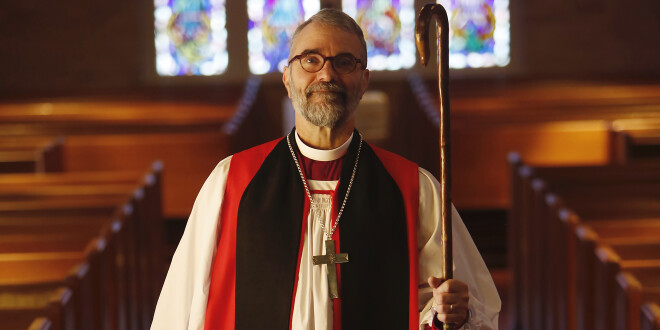As bishop I have sought to limit my comments on political matters to issues that both touch personally on our own people and locale, and which involve fairly directly a theological principle. At the same time, our landscape is so polarized and often angry that finding an approach which has a likelihood of being heard is a challenge. In addition, the tragedy at Uvalde was so painful and appalling that it generates emotional reactions in various directions. As a result, my main goals are to point out some facts, uncomfortable though they be, and consider their theological implications. Bearing true witness to our neighbor is in the Decalogue too.
Thomas Aquinas put his discussion of just war, another question treating the justifiable use of force, in a section of his magnum opus dealing with protecting widows and orphans. Another way to say this is that the Church has a prime interest in protecting the vulnerable. It is in the context of such protection that the Church should set its discussions about the use of violence. How to do this, on various issues, will provoke debate- fair enough. But that is the purpose which should animate us. It is clear that society failed to protect the vulnerable on that day at that school in Uvalde.
Now there were clearly serious errors on the part of the police- this has been shown in detail, but I do not face the dangers which their calling involves. Suffice it to say that the police were recoiling from that fact that that 18-year-old in his protective armor with his combat weapons seriously outgunned them. Step back from the partisan debate and feel how wrong that is—the availability of that kind of gun makes the protection of the vulnerable harder.
But what, one may ask, of its valid uses? I know very little about guns, but I have consulted with a lifelong hunter and outdoorsman who knows a lot more. He confirmed that a gun with such a high-capacity magazine and semiautomatic action has little use for hunting—it is designed for war. Nor could one imagine it in use for individual protection. The friend I consulted is of the opinion that the real reason such a gun is important to some Americans is as a protection against a tyrannous government. As to armed vigilantes, we do well to recall that the framers of the Constitution were worried not only about an oppressive king in England, but also about the mobs in France. We ought to share this worry too (hence the support for good order provided by the Roman Empire, no less, in Romans 13).
All of this sounds too theoretical and high-minded. Christian theology should have a sharper nose for vice, e.g., avarice. The AR-15 is marketed specifically to young people; in so doing the company deliberately plays on video games like ‘Call of Duty’, which the shooter liked. The killer was part of the audience the manufacturer had in mind. Manipulation of the impressionable for profit when tangible harm is foreseeable is evil. Think about that for a moment. The marketing of cigarettes deliberately to young people some years ago comes to mind (or, more recently, aggressive marketing of opioids to doctors and patients). In both cases the lawsuits that ensued were an example of the ‘left hand of God,’ working through secular means.
I have sought to argue in earlier blog entries, for democracy, and especially the balance of powers and the protection of fair elections, on Christian grounds. I appealed to Reinhold Niebuhr’s argument that we are good enough to make it possible and evil enough to make it necessary. I would include the Bill of Rights in that argument. But none of the rights there insured can be absolute, the example of shouting ‘fire’ in a crowded theater coming most readily to mind. We must consider the end or goal of any of the rights in question.
This brings us specifically to the Second Amendment. I am also not a lawyer (though the Church does know a thing or two about context and plain sense in reading old texts). There has certainly been a lawyerly debate about whether the Amendment has in mind state national guards or individual rights. (In a more comic vein, my late father, a dyed in the wool Republican, who lived not far from Lexington and Concord, quipped that the originalist reading guaranteed the right to a musket). In an editorial in the New York Times (5/31/22), the clerk for the legendary Justice Antonin Scalia argued in the seminal decision (DC vs. Heller, 2008) for the right to a handgun in one’s home for self-protection. But he could also see a place for background checks, and furthermore supported ‘the historical tradition’ of prohibiting dangerous and unusual weapons’, e.g., machine guns. In short, Antonin Scalia’s classically conservative view has, in our time, come to represent a centrist point of possible agreement (unless the issue is simply a culture-war shibboleth). One could argue that a view like that of Scalia (a devout Roman Catholic), assumed the doctrine of original sin which undergirds both allowing some weapons for self-protection and prohibiting others from use by those bent on mayhem.
I have come to believe that, in the harsh political landscape of our nation, the best we can hope for at present is to find very limited overlaps in the partisan Venn diagram. They aren’t enough, but they are a place to begin: legitimating DACAs, for example, or strengthening the Electoral Count Act. I believe that returning to the ban on weapons such as the AR-15 (a ban in place during the first George W. Bush Administration!) is one that has, in this painful moment, become imperative. Whether you agree at first or disagree, I hope that we can pause from the usual hostilities long enough to give the facts before, and the theological implications behind, this question, thought.
Peace,
+GRS




